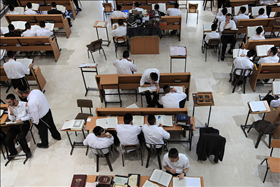Summer 2010 Index
Religion and State Index for the second half of 2010: 80% of the Jewish public objects to new religious legislation; 75% favor decreasing funding for yeshivas
28/02/2011 13:15
Tags: religion · Jewish · haredim · equality

Haredi yeshiva Flash90
Summer 2010 Index Religion and State Index for the second half of 2010: 80% of the Jewish public objects to new religious legislation; 75% favor decreasing funding for yeshivas The second half of 2010 saw a significant rise in support for religious freedom and for greater equality in shouldering the national burden, according to the public opinion survey Religion and State Index – Summer 2010. The study was carried out by the Smith Research Institute on behalf of Hiddush – Religious Freedom for Israel. The survey found that 80% of the Jewish public is opposed to new religious legislation, compared to 70% in the winter index. 59% of the public wants a separation of religion and state, compared to 55% in the previous index. 61% support recognition for all types of marriage, up from 55% in the winter index. 75% support reducing funding for yeshivas, compared to 68% half a year ago.
This year, which contained so many incidents in the areas of religion and state, also impacted the national agenda. Nearly three quarters of the Jewish public in Israel (73%) view the tension between ultra-Orthodox and secular Jews as the greatest (49%) or second-greatest tension (24%) in Jewish society. This represents a substantial increase, up from 65% in the winter index. Next in severity comes the tension between the political right and left, with only 44%. The tension between Mizrahim and Ashkenazim received only 23% despite the Immanuel affair.
The head of Hiddush, Rabbi Uri Regev, said in response: “A wide and profound chasm yawns between the public’s desire for religious freedom and equality in shouldering the burden and the coalition’s fire sale of rights belonging to the Zionist majority. It is difficult to understand the government members who are wrapping up another year of giving in to the haredi parties’ extortion, and it looks like they are readily marching toward a new year of kowtowing to the tyranny of the haredi minority.”
Regev added: “Benjamin Netanyahu will not be able for long to let the wheeler-dealers of the haredi parties impose religious fanaticism here, transfer astronomical sums from the public coffers to their institutions, and perpetuate the shirking of military service, work, and education. He will not be able for long to continue with the policy that is causing irreparable damage to the state’s economy and to its security. The conclusion is clear: A civilian emergency government must be formed to carry out the necessary civilian revolution and stop the buying of government at the expense of our children’s future.”
The Religion and State Index is a semi-annual public opinion study that Hiddush commissions to monitor the state of mind on matters of religion and state. The study is published twice a year, on the eve of Rosh Hashanah and the eve of Passover. The current index is based on a poll that was conducted in mid-July among an unusually large sample of 800 people from the adult Jewish population. As usual, the index checked the public’s attitude toward a long list of matters that preoccupied it this year. Here are some of the topics:
Core curriculum. Three quarters of the general public (76%) think that haredi schools should be required to teach the state’s core curriculum, which includes mathematics, English, sciences, and civics. 62%, nearly two thirds of the Jewish public, favors withholding funding from schools that do not teach the core curriculum, including 80% of Likud voters.
Getting haredim out to work. Three out of every four (75%) support a reduction in funding for yeshivas and big families to impel haredi men to get a job. This represents a 7% increase from 68% in the January study.
Burial site fights. Two thirds of respondents (67%), including 52% of the religious ones, are in favor of vacating ancient graves for construction purposes.
Racism in Immanuel. 80% of the Jewish public thinks that the admission quotas for Sephardim at Ashkenazi haredi schools constitute ethnic discrimination. 73% of respondents, nearly three quarters, thought that the state should not finance institutions that have admission quotas for Sephardim.
Marriage and conversion. 61% of the Jewish public wants Israel to recognize all types of marriage. This is a significant increase of 6% over the January index (55%). 61% of the Jewish public supports breaking the Orthodox monopoly on conversion and state recognition of the various conversion tracks customary to the Jewish people.
Gender-segregated bus lines. 70% are in favor of either abolishing the arrangement (40%) or shrinking it (30%). Only 8% of the public would like to see more bus lines that separate men and women.
Further info in Hebrew on Maariv
Further info in Hebrew on Globes